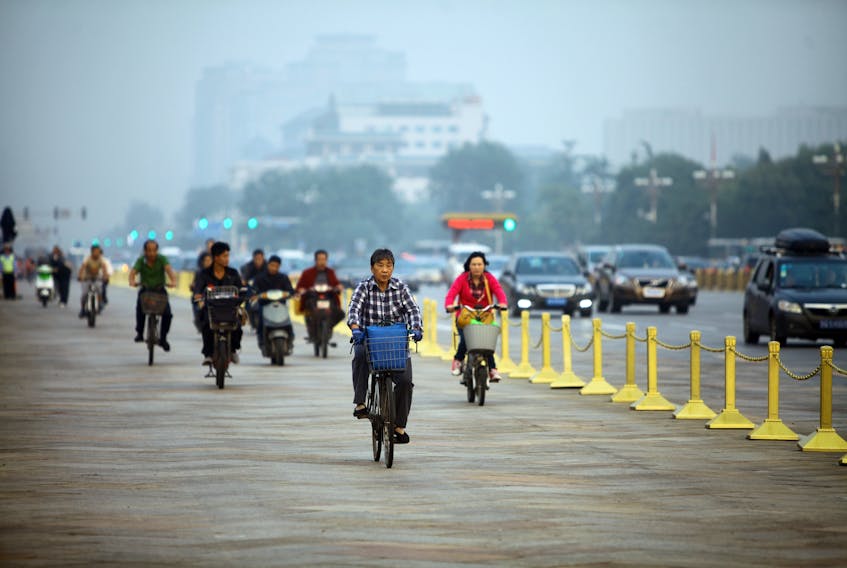Actions to combat the ravages of climate change are not keeping pace with the fallout from rising global greenhouse gas emissions. And as we all know, the clock on the planet’s survivability is ticking — faster and faster.
I’ve been asking myself an unsettling question: Are liberal democracies incapable of taking serious measures to address the current climate emergency? Put another way: Are authoritarian or illiberal states better suited to tackle the existential issue of impending climate chaos?
First off, I’m certainly not making a case for an expansion of autocratic regimes. Nor am I suggesting that the solution to the climate change crisis is to do away with democratic states. I am firm believer in the virtues of constitutional democracy, multi-party elections, a bevy of rights and freedoms and the rule of law.
Still, it’s hard not to argue that the biggest brake on fixing the climate crisis is not the science, which is incontrovertible, but the political will and courage to act decisively and meaningfully. It looks more and more like elected governments fear political retribution for purposely confronting climate change with public resources. In short, they worry that the electoral costs of doing something make it easier and more attractive politically to do nothing — all the while trying to convince some voters that they are doing something substantive.
Public opposition to costly abatement initiatives, negative press coverage, the existence of political parties populated by climate skeptics and significant corporate pushback, when taken together, all add up to a highly unfriendly electoral environment. Accordingly, politicians of all political stripes can sense this and are responding with an eye toward the next election cycle.
One could argue, then, that democratic governments make it harder to combat turbo-charged global warming. That is, that short-term political or electoral calculations invariably trump long-term actions to wrestle the scourge of climate change to the ground. Politics and self-interest, in the end, take precedence over genuine actions to decarbonize the economic and environmental space.
Is it, then, axiomatic that non-democratic or authoritarian states are more successful at battling a changing climate? In other words, does the absence of electoral politics in dictatorial countries make the cobbling together of a comprehensive and effective climate change plan more likely? Moreover, are not autocratic states in a far stronger position, especially given their easy recourse to repression, state-directed violence and the quashing of public dissent, to enforce their environmental priorities than democratic countries?
In this context, China presents itself as an interesting and illuminating case study — since it would follow, if the above argument holds, that one-party states like China would be better able to confront the current climate emergency. And the key rationale for saying so is the lack of electoral impediments and costs preventing them from actually implementing serious climate change measures.
For China’s part, it goes without saying that it faces enormous environmental challenges, increasing civil society pressures about runaway global warming and an obvious need to be respected internationally. Yet its record on addressing climate change is no better than that of democratic states.
It is true that China has made progress on dealing with a major air pollution problem in Beijing, has reduced its domestic use of dirty coal and is the largest investor in renewable energy. But it is still the largest contributor of carbon dioxide emissions in the world, has actually exported its coal problem to poorer neighbours and has done precious little to promote international environmental co-operation.
In fact, the Middle Kingdom has played an obstructionist role in international climate change negotiations — particularly at the 2009 COP 15 Summit in Copenhagen.
The reasons why China’s climate change response has been lacking begins and ends with domestic constraints. Significantly, the Chinese government is extremely nervous about political instability, social unrest, public dissent and challenges to the pre-eminence of the Chinese Communist Party.
To maintain its tight grip on the reins of power, then, Beijing has no intention of embracing an all-encompassing climate change program if it hurts powerful economic interests in the country or slows down the expansion of a moneyed middle class. Simply put, the security of the state, the maintenance of a one-party government and the economic well-being of the Chinese will always take precedence over advancing meaningful climate change mitigation initiatives.
So if we want democracies to respond forcefully to a changing climate, then the general public has to take ownership of this critical environmental challenge. Indeed, it is only when elected political leaders and politicians feel the political heat that they will undertake concerted climate action. But if there are no votes associated with taking that action — and a stark realization of the serious political costs involved for doing so —then democratic governments, like dictatorial states, are going to be loath to combat the current climate crisis.
Peter McKenna is professor of political science at the University of Prince Edward Island in Charlottetown.









